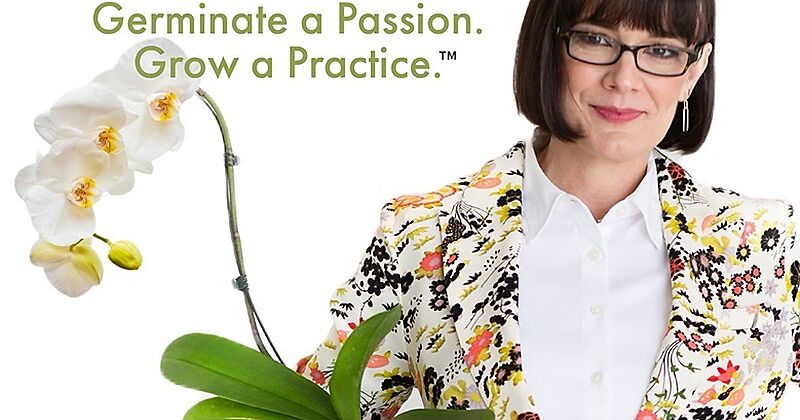Botanical Business: Don't Pay the Plant Passion Tax!

Plan for Profit, Not just Passion
Thinking of starting a botanical business or a plant-based professional career?
There’s something particularly romantic about the horticulture and gardening industry, isn’t there? It's very easy to be seduced by the idea of starting a plant-based business or making a career transition into the green industry. It’s common to focus only on what you think you’ll be doing – in terms of tasks or practices - in a particular type of business such as plant shop or garden design business.
There’s nothing wrong with fantasizing about starting your own plant-growing operation, or hip native plant design business…but an important thing you’ll need to realize is that while your love of plants may inspire your career or entrepreneurial goals, it’s people who will ultimately determine your success and satisfaction.
Ultimately - and this is the thing you learn after working in a particular industry or type of business for a long time – what you’ll actually be doing in your business or career ends up being about WHO you are serving…and who you must work with in order to serve them.
Your clients, customers, and co-workers are your business and your job.
And let me be frank: hobby gardening in your own home landscape alone is in no way adequate preparation to perform as a professional in the industry. It may be fun and inspiring, but at this stage you really do not know what you do not know! Nor is becoming a master gardener, which is a volunteer outreach program not a professional training program. Performing landscaping or garden services on someone else's property for profit requires a much higher level of knowledge, experience, resources, and legal protection.
Horticulture Career Transplanters
Transitioning from a personal plant passion to a plant profession takes education and dedication, as it does with any industry; especially one that is rooted in science. If you're inexperienced, or have a low level of entry credentials, you're likely going to have to do some entry level work to gain hands on experience. Don't make the mistake of thinking you can skip all the science or all the hands-on experience if you want to be perceived as a knowledgeable professional within the horticulture industry. You must actually know a pretty fair amount of plant science and horticultural techniques learned by repetition and observation if you want to get your facts strait and manifest success. Horticulture is an applied science, after all.
If you're dreaming of starting a botanical business you may not need degrees or advanced plant science education, but that depends on what products or services you plan to sell.
From Plant Passion to Plant Profession
Anyone who has turned their hobby or passion into a profession will likely tell you that all the day-to-day activities that go into running a business or having a successful career often syphon off some of the passion-based joy. If you loving working with plants hands-on, know that you’ll be spending less time doing that depending on the type of business or career you choose. That's called the passion tax...or in this case the plant passion tax!
To add to that, what you happen to be innately really good at (let's say numbers or financial planning) may end up being what you spend the most time doing...not playing with plants. So also think about what things are you are innately good at and do you enjoy doing them?
It's smart to separate passion from proficiency, even if social media has brainwashed you into thinking you must be passionate about EVERYTHING you do to earn a living. I'm looking at three brand new messages from random sales people in my LinkedIn box right now, all telling me they are PASSIONATE about growing my business! Baloney. What they are PASSIONATE about is making money (or maybe they are passionate about number crunching or listening to themselves talk, whatever!) What they may be good at is growing my business. Just be real with yourself and your customer.
Passion doesn't always equate to profit. So make sure you understand the distinction and stay focused on your actual goals for your business or career.
CASE STUDY
Me? I'm passionate about plants, and gardening, and art...not your financial projections. But I'm good at financial projections and turning a profit, so I can leverage that proficiency to earn a living in a plant-based industry by helping you grow your business.
In my own case, I started a horticulture and botany career because of a love of plants. I thought I'd be spending most of my time in hands-on-plants activities and research. In reality, I've ended up spending a much larger portion of my career and business writing and communicating about plants, horticulture, and business as well as generating profit in consumer facing businesses. Turns out, even with no formal training I developed a decent ability for writing and communications, which ended up commanding a lot of my time and successfully so. And I discovered I'm highly analytical and adept at forecasting and managing inventory. My brain just likes latching onto those numbers in a circular fashion to project outcomes. Who knew? Certainly NONE of the teachers I had throughout school who told me I was "bad at math" and "not college material." For real.
It's a very good thing that I really enjoy writing (and the solitude it brings me), or else I'd have been miserable as a plant-passioned horticulturist! I also ended up really enjoying mentoring and teaching people about plants and horticulture business. That's the reason, in my own opinion, I was very successful in the garden center retail sector. I actually liked communicating with and teaching retail customers. Now, teaching also takes up a big portion of my time in a much larger and formal scale. Again, I've had no formal training and had no plans to be a teacher. Your innate aptitudes will seep into whatever you do, plants or no plants. The faster you can identify your natural talents and how you can use them to adapt successfully with in the horticulture industry - even if it appears to be a non conventional path - the better!
In your own case, for example, If you really love talking to people and you're good at managing people - or seem very capable to others at doing so - no doubt this is going to be something that ends up taking up a lot of your time (job or business). It's what you'll often spend most of your time doing if you expand your business and have to manage a staff. This will work greatly in your favor in businesses such as retail garden centers, plant shops, gardening services, landscape design/build firms. etc. If you do not enjoy talking to people or working with customers (or managing people), but along with your love of plants you have a really keen sense of observation and are very organized and schedule-oriented, you may be the next world's best wholesale greenhouse grower!
If you're a botanical business entrepreneur, or a green industry career transplanter, I’d like to challenge you a bit to change your perspective about your passion-based intention. Instead of the job activities, instead ask yourself “Who is it you really want to serve and who do you want to work with to make that happen?” Second to that, what are you proficient (but not passionate about) that can serve you in the right type of industry niche or type of business?
Learn to Grow
If you dream of starting a botanical business or plant profession, be sure to check out my upcoming courses through UCLAx The Business of Horticulture and The Business of Selling Plants as well as my new Botanical Business Group Coaching sessions!


